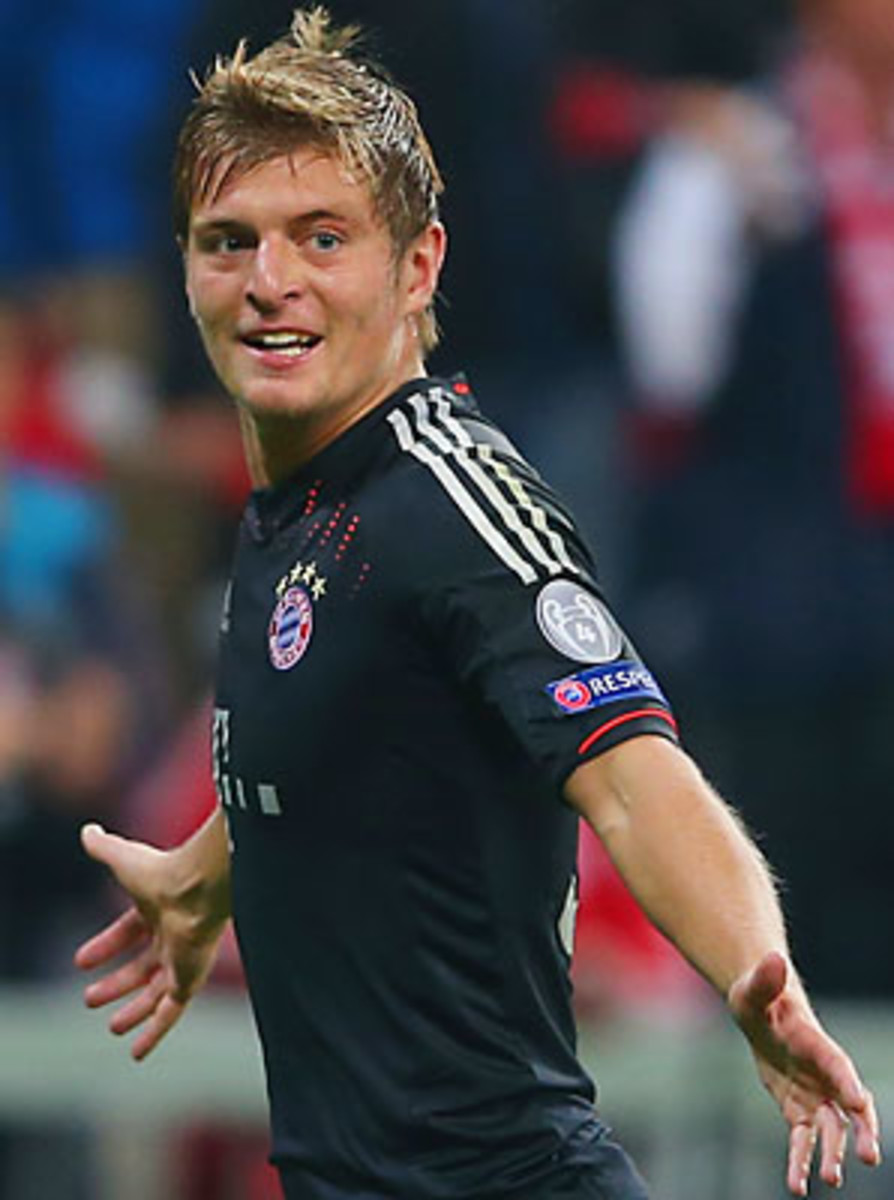Kroos emerges as talk of Bayern Munich, challenging German stars


Bayern Munich has long prided itself on its youth development, and with some justification: half of the first-team regulars that made it to the Champions League final in May came through the club's academy system. But they don't always get it right in Bavaria.
"Toni Kroos is the most naturally gifted player I have ever seen since Karl-Heinz Rummenigge," Bayern's head of youth development Werner Kern told SI.com in October 2010. "In my view, it was a grave mistake sending him out to loan to Leverkusen for 18 months."
The young midfielder had established himself as a bona fide Bundesliga professional during his successful spell at the Bay-Arena, but the inference was obvious: Kroos, Kern felt, had not nearly developed as well as his talent had warranted.
Fast forward two years and the mood at Säbener Strasse, the club's HQ, has very much changed. For all the brilliance of the re-emerging Bastian Schweinsteiger, the imperious poise of Javier Martinez, the finishing of Mario Mandzukic and the overall quality of Jupp Heynckes' vastly improved squad, the name on everyone's lips is Toni Kroos.
Bayern's No. 39 has come into his own in his preferred position as the most advanced central midfielder, scoring three goals in the league and one in the Champions League. All of them were absolute beauties, too: there are few better strikers of the ball than the 22-year-old from Greifswald in Northeast Germany.
A steady supply of goals had been missing from his game until recently along with an even more essential ingredient: a die-hard will to win. Kroos' elegance on the ball would often drift into a kind of self-satisfied detachment, to the point that he was happy to simply be swept along.
"Toni is the ideal player in this position," Heynckes said. "But it takes more than being gentle with the ball. He sometimes needs reminding of that. He, too, can do more."
New sporting director Matthias Sammer said something similar a few weeks ago: "Toni has extraordinary talent. But he needs to get to the point where he's really utilizing his potential. He needs to find and keep that hunger (to succeed)."
If Sammer is really responsible for Kroos' change of mind, as the player intimated -- "he has an aura that's very important for us young players, he's someone that can get the last few percentage points out of you" -- then his employment has already been vindicated. Kroos has finally started pushing himself that extra bit further.
Thomas Müller, who's far less talented technically but better at getting the most out of himself, can no longer hope to be an automatic starter in the No. 10/playmaker position, such has been Kroos' development. An important breakthrough came in the semifinal against Real Madrid in May when he completely bossed a midfield populated by international superstars. He can play the killer pass, bring order and symmetry into congested space and, most importantly, keep possession for his team.
"The ball is safe with him," Bayern assistant coach and former youth manager Hermann Gerland once memorably observed.
In school, they had realized his phenomenal potential early. "He was so good that they made him play without boots to give the opponents a chance," remembered his former teacher Sieglinde Heimann in an interview with Welt. Kroos was a fairly lazy student, doing little more than the bare minimum to graduate.
When he was 16, Kroos, the son of a former GDR badminton champion mother, signed with Bayern and moved into the club's boarding school. A year later, he was voted best player at the U17 World Cup. He started playing for Bayern's first team, scored a goal in the UEFA Cup and was promised the No. 10 shirt by general manager Uli Hoeness. Then fate, in the shape of Jürgen Klinsmann, intervened. The Swabian handed Kroos only three league starts as Bayern manager in the 2008-09 season. The player's father and agent, Roland Kroos, angrily complained that Klinsmann "had no plan" for the player's development. The budding midfielder was sent out to loan to Leverkusen during the winter break and soon flourished with the help of Heynckes, who was in charge at the Bay-Arena at the time.
Leverkusen tried hard to keep him after his loan spell had come to an end in the summer of 2010, but Bayern didn't relent. It took another year of mixed success under Louis van Gaal, who was mostly playing him in a deeper position, for him to truly come into his own as the attacking linchpin. Kroos has emerged from his own shadow, and that of Schweinsteiger, his Bayern teammate.
"There is no reason why I shouldn't keep playing in my favorite position," he said after scoring in a 2-0 win over Schalke on Saturday, with typical confidence.
The next step up would be to make that spot his own in the national team, too. He's up against considerable rivals like Mesut Özil, Marco Reus and Mario Götze, but manager Joachim Löw will not be able to overlook him if his career trajectory continues on the same path. Playing him as a No. 6 in front of the back four has been less successful. Using him as a man-marker against Andrea Pirlo in the Euro semifinal against Italy was Löw's darkest hour. Kroos' potential was wasted, along with most of his team's by Germany adapting too much to the Italian narrow midfield.
It'll be interesting to see if Kroos comes into contention for the "in the hole" position against Ireland in October. In the meantime, Werder Bremen will have its work cut out to stop Kroos running the show again when Thomas Schaaf's team hosts league leader Bayern on Saturday. The good news for the home side is that it can also call on a bit of Kroos magic in midfield. But it's that of Toni's less brilliant younger brother Felix, unfortunately.
